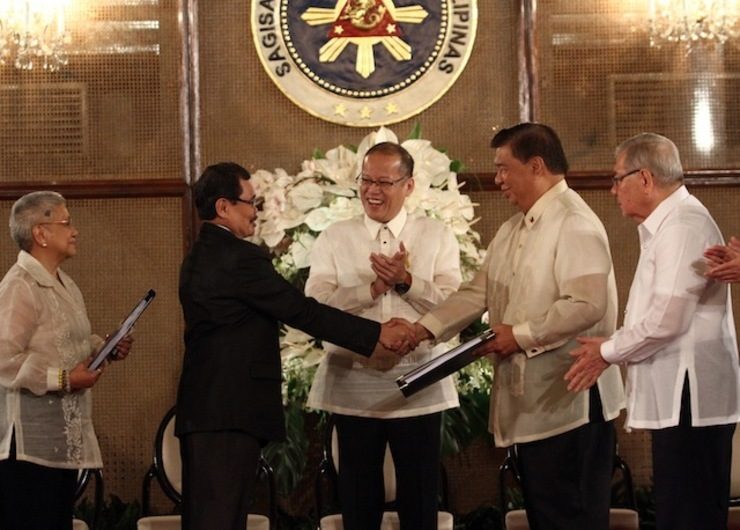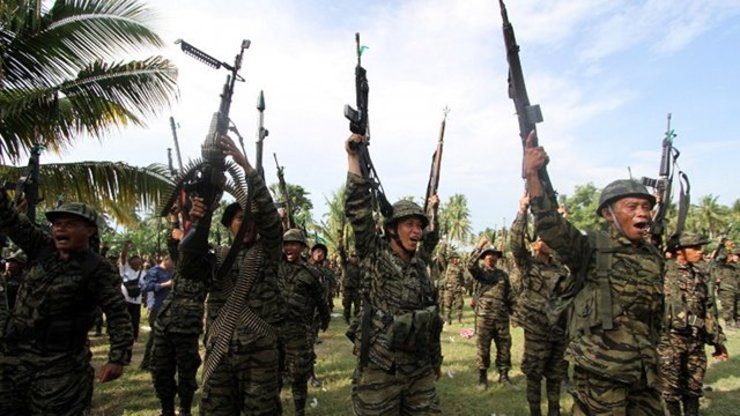SUMMARY
This is AI generated summarization, which may have errors. For context, always refer to the full article.

MANILA, Philippines – It’s the legal luminaries’ turn to share their verdict on the proposed law seeking to create a new autonomous region in Muslim Mindanao.
Former Supreme Court justices and legal experts face the ad hoc committee in the House of Representatives tackling the proposed Bangsamoro Basic Law on Tuesday, October 28, and Wednesday, October 29.
At least one of the invited guests, Philippine Constitutional Association (Philconsa) president Manuel Lazaro, has already called certain provisions of the peace deal between the government and the Moro Islamic Liberation Front (MILF) as unconstitutional.
Lazaro earlier raised concerns over what he called vague and unclear provisions on the “asymmetric” relationship between the government and envisioned Bangsamoro entity, as well as the proposed territory.
The Philconsa president made the remarks before President Benigno Aquino III submitted to Congress the Bangsamoro bill, crafted by the MILF-led Bangsamoro Transition Commission (BTC) and Malacañang representatives.
Tuesday’s hearing will mark the first time that legal experts will come together in Congress to officially register their position on the constitutionality of the bill that seeks to replace the Autonomous Region in Muslim Mindanao (ARMM) with a parliamentary government that has greater political and fiscal autonomy.
Aside from Lazaro, Senator Miriam Defensor Santiago, a constitutional law expert, has also called the government and MILF peace deal as illegal because it creates a substate instead of a mere autonomous region – one of the basis that the Supreme Court cited in declaring as unconstitutional the Memorandum of Agreement on Ancestral Domain (MOA-AD) between the Arroyo government and the MILF in 2008.
Despite the concerns, there has been no serious challenge to the Comprehensive Agreement on the Bangsamoro filed before the Supreme Court to date. Aquino has also repeatedly vouched for the constitutionality of the measure.
The submission of the proposed law to Congress was delayed when it took Malacañang months to conducts its review after the BTC submitted the first version of the bill.
Insiders said the Malacañang review took a while because some provisions of the first draft were unconstitutional and not originally included in the peace deal. The MILF, meanwhile, accused the Malacañang of diluting the original BTC draft.
The current version of the Bangsamoro bill now being deliberated in Congress is the product of further discussions between Malacañang and the BTC.
While the MILF has called on Congress to pass the Bangsamoro bill as is, there is no stopping Congress from introducing changes.
However, Congress has to strike a balance between amending the proposed law and staying true to the signed final peace pact. If not, the final product may go the way of the current ARMM Organic Act, that was “disowned” by the Moro National Liberation Front (MNLF), which signed a peace pact with the government in 1996.
Up to now, the MNLF has accused the government of failing to implement the peace deal in full.
What happened before: the MOA-AD debacle

The ghost of the past hovers over discussions on the constitutionality of the proposed Bangsamoro Basic Law.
In 2008, the MILF and the government had attempted to create a “Bangsamoro Juridical Entity” (BJE) that would have enjoyed its own legislative, administrative, security, financial, judicial and educations systems under the failed MOA-AD.
Before the agreement could be signed in Kuala Lumpur, local officials in key Mindanao cities and provinces, as well as national officials, questioned it before the Supreme Court over the lack of public consultation on the contents of the bill.
The SC issued a temporary restraining order on the signing, causing a firefight to break out between the MILF and the Philippine military, displacing around 600,000 people. The high court later declared the MOA-AD as unconstitutional.
Among the petitioners were then Zamboanga City mayor and now first district Representative Celso Lobregat, then North Cotabato vice governor Emmanuel Piñol, former North Cotabato governor and now Representative Jesus Sacdalan, former Iligan City mayor Lawrence Cruz, then Makati mayor and now Vice President Jejomar Binay, Senator Franklin Drilon, lawyer Adel Tamano, then Senator and now Interior Secretary Manuel Roxas, then senator Ernesto Maceda, and lawyer Aquilino Pimentel III.
Under the MOA-AD, the BJE would have been allowed to enter into economic agreements and trade relations with other countries.
It would have also enjoyed an “associative relationship” with the government, which would give it the status of an independent state – a standing that is beyond the bounds of the Constitution.
The Supreme Court declared the MOA-AD as unconstitutional for creating a sub-state – the same issue now being hurled at the Bangsamoro.
In its 89-page decision penned by then Associate Justice and now Ombudsman Conchita Carpio-Morales, the High Court said the “associative relationship envisioned between the GRP and the BJE is unconstitutional, for the concept presupposes that the associated entity is a state and implies that the same is on its way to independence.”
The SC rejected the MOA-AD’s creation of ancestral domains, which would have required Constitutional amendments, through a mere peace deal.
“The statute does not grant the executive department or any government agency the power to delineate and recognize an ancestral domain claim by mere agreement or compromise,” the Court said.
This time around, the Bangsamoro bill will go through two rounds of voting before it can be enacted – in Congress and through a plebiscite.
Core territories will also have the choice to vote on whether they want to be included in the new autonomous region.
The House and the Senate are in the midst of conducting public consultations in Mindanao as they aim to pass the bill by the first quarter of 2015.
Further addressing concerns over the so-called unconstitutional provisions of the proposed law is now in the hands of Congress.
As Cagayan de Oro 2nd district Representative Rufus Rodriguez, chairman of the House ad hoc committee, said at the beginning of the hearings, “We will not allow an unconstitutional Bangsamoro Basic Law to be passed in the House.”
Pressing issues
Most of the issues raised by lawmakers and stakeholders in relation to the constitutionality of the basic law has revolved around how powers will be shared between the Bangsamoro government and the central government – which Senator Ferdinand “Bongbong” Marcos Jr has called as the “single biggest issue” in the discussions.
In previous hearings, lawmakers and stakeholders sought to clarify the extent of the powers of the Bangsamoro Chief Minister in relation to the President, as well as different branches of govenrment.
The proposed law has provided for a number of “intergovernmental relations mechanisms” that would see the Bangsamoro government and national branches and agencies collaborate on matters that interlap with each other.
Some of the issues that have been raised include:
- The extent of the Bangsamoro’s power to create LGUs within its territory given that Congress has the power to create of new legislative districts
- Preferential rights in Bangsamoro Waters and the Zones of Cooperation
- Who will prevail if the Philippine Congress and the Bangsamoro Parliament Forum contradict each other
- What will prevail if there is a difference between the Bangsamoro development plan and the national development plan
- If the Bangsamoro police will still be under the direct control of the PNP chief
- What will prevail if there is disparity between the report of the Commission on Audit and the Bangsamoro Commission on Audit
More than constitutional issues, Rodriguez said lawmakers’ more pressing concerns center on operational aspects of the law, such as the boundary of territories, as well as how the proposed scheme for fishing grounds in the Bangsamoro would be implemented.
In an interview with the Institute for Autonomy and Governance, Rodriguez said parties have already learned from past mistakes.
“Everything now is in the hands of Congress to make this entity, the Bangsamoro. Everything now is in the House and now we are going [around] in the biggest and pervasive consultations that I can remember in my seven years in Congress. This is the bill that will have this kind of widespread and inclusive consultation,” Rodriguez said.
The House ad hoc committee on the Bangsamoro invited the following former justices:
- Chief Justice Hilario Davide Jr, Reynato Puno, and Artemio Panganiban
- former Supreme Court Justices Adolf Azcuna, Vicente Mendoza, Antonio Eduardo Nachura, and Leonardo Quisumbing
Legal experts invited include:
- Justice Manuel Lazaro, president of Philippine Constitution Association
- Vicente Joyas, president of the Integrated Bar of the Philippines (IBP)
- Beda Fajardo, president of Philippine Bar Association
- Danilo Concepcion, law dean of University of the Philippines
- Sedfrey Candelaria, law dean of the Ateneo Law School
- Melencio Sta Maria, dean of the Far Eastern University Institute of Law
- Virgilio Jara, dean of the San Beda College of Law
- Jose Sundiang, dean of the Arellano University College of Law
- Ferdinand Tan, dean of the San Sebastian College of Law
- Christian Monsod, former member of the 1986 Constitutional Commission
- Roan Libarios, former IBP president
- Nasser Marohomsalic, member of the Independent Panel of Lawyers
- Avelino Cruz Jr, former Arroyo chief leagal counsel and defense secretary
Read the draft Bangsamoro Basic Law here. – Rappler.com
Add a comment
How does this make you feel?
There are no comments yet. Add your comment to start the conversation.